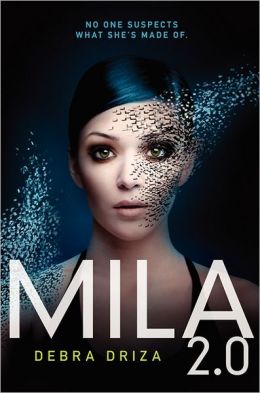Let's see if you can spot it:
 |
| She's mostly made of angst and tears. |
Mila 2.0 by Debra Driza had the potential for a lot of cool. I've been interested in it since before it even came out, but I've been disappointed so many times that I now physically recoil from books of authors I am unfamiliar with. However, the siren song of the Kindle Daily Deal and its low price of $2 was too much to pass up.
Mila 2.0 started out good. Mila gets in an accident and realizes she's an android, from there it's a whirlwind of cool as she's on the run with her adopted mother as they try to escape the group that created her. They capture her, of course, and then Mila spends the rest of the book emo-ing and freaking out that something is going to happen to her. She's pretty much paralyzed with fear until the last couple of chapters when she escapes and then the book suddenly runs out of pages just when it starts to promise that it will get better.
 |
| A book about waiting. |
This book, simply put, is about waiting. Rhine, the protagonist, bides her time the entirety of the story, of which spans ten months as she struggles with both a mix of fear and Stockholm Syndrome. She sits and waits for the perfect opportunity to escape her situation until, finally, the time presents itself and she promptly walks out.
Now, neither of these are, by any means, bad books. I didn't constantly roll my eyes and feel the need to throw them across the room (which, considering they're on a Kindle device, would be costly), but I didn't love them to bits either. I would consider reading the sequels of both, but only if they were less than five dollarydoos each.
 |
| An actual currency. |
Both books have a large theme going: Both protagonists spent the majority of their time waiting for a specific opportunity, and in the meantime they wait. I'm actually specifically avoiding using the term "heroine" for the main characters because heroine is defined as "a woman admired or idealized for her courage, outstanding achievements, or noble qualities." whereas protagonist is "the leading character or one of the major characters in a drama, movie, novel, or other fictional text."
Now, I'm not a feminist by any means, but if the main character is a docile bunny waiting for something to happen, then your readers are waiting for something to happen, too. You don't read books because you want to read about waiting, you read books sometimes because you are waiting.
 |
| Wait-ception. |
You want vicarious action while you stand in line at the post office/bank/DMV.
This is all based on a writing article I read a long time ago that I wish I could find again. It was so inspiring to me that it has been probably the single piece of writing advice that I have taken to heart. I recall the (I'll word it more cleanly here) "Go out and do stuff" versus "Have stuff done to you" where the article-writer did a comparison of Alice in Wonderland and The Wizard of Oz.
 |
| The fact that I can find a picture of Dorothy kicking the crap out of Alice just means you can find anything on the Internet. |
In Alice in Wonderland, Alice falls down the rabbit hole and is promptly subjected to all manner of things. Everyone around her pushes, pulls, and directs her movements. Dorothy, meanwhile, has an objective at all times, she makes her own way through the world.
Ever since then I have read books (YA books in particular) keeping this concept in mind, because I find that when the protagonist is always being lead around, or is waiting for something to happen, I find myself getting more entertainment from counting the ceiling tiles.
I try to keep this concept in mind for my own writing as well. In Dusted it's somewhat of a mix, while Crystal and company do find themselves being led around sometimes, they do often set out on their own without someone pulling them along the entire way.
Of course, that's not to say everything should always go the protagonist's way. That creates a Mary Sue problem (of which I already discussed Here). Instead, sometimes you need the situation to spiral out of control of the main character, that creates conflict, but if the character is nothing but a rug to be walked all over, what's the point?
Or you could fill the waiting time with blank pages (Snark).
ReplyDelete